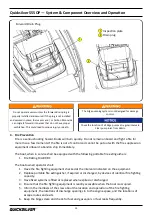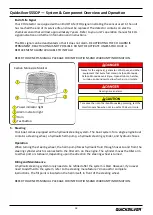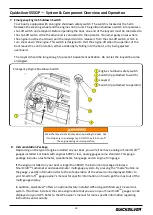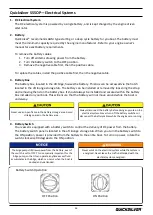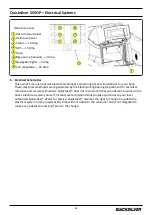
Quicksilver 555OP — System & Component Overview and Operation
13
engine(s) have been tested to perform with the maximum level of ethanol blended gasoline (10%
ethanol), currently allowed by the EPA in the United States.
Special precautions should be considered with the use of fuel containing ethanol in your system. Fuels
with ethanol can attack some fuel
-
system components, such as tanks and lines, if they are not made
from acceptable ethanol
-
compatible materials. This can lead to operational problems or safety issues
such as clogged filters, leaks, or engine damage.
Your boat was manufactured, and shipped from the factory with ethanol compatible materials. Before
introducing petrol with ethanol into your fuel tank, ask your dealer if any components have been
added or replaced that are not recommended by Quicksilver®, Mercury or may not be ethanol
-
compatible.
Filling The Tank
It is best to maintain a full tank of fuel when the engine is not in use. This will reduce the air flow in
and out of the tank due to changes in temperature as well as limiting exposure of ethanol in the fuel
to humidity and condensation.
When filling the tank, do not attempt to top off the tank. When the nozzle shuts off, the tank is full,
and continuing to fill past the fuel fill shutoff will cause the system to spit fuel back.
Phase Separation
Humidity and condensation create water in your fuel tank which can adversely effect the ethanol
blended fuel. A condition called phase separation can occur if water is drawn into the fuel beyond the
saturation point. The presence for water in the fuel beyond the saturation level will cause most of the
ethanol in the fuel to separate from the bulk fuel and drop to the bottom of the tank, significantly
reducing the level of ethanol in the fuel mixture in the upper level (phase). If the lower level (phase),
consisting of water and ethanol, is deep enough to reach the fuel inlet, it could be pumped directly
into the engine and cause significant problems. Engine problems can also result from the reduced
ethanol/fuel mixture left in the upper phase of the tank.
Additives
There is no practical additive known that can prevent or correct phase separation. The only solution is
to keep water from accumulating in the tank. If phase separation does occur, your only remedy is to
drain the fuel, clean and dry the tank completely and refill with a fresh, clean tank of fuel.
Fuel Filters
Mercury already provided the appropriate level of filtration to protect the engine from debris. The
addition of another in
-
line filter to the system will create a possible flow restriction that can starve the
engine of fuel. As a precaution, it is advisable to carry extra on
-
engine filters in case filter plugging
from debris becomes a problem during boating.
Maintenance
Periodically inspect for the presence of water in the fuel tank. If any is found, all water must be
removed and the tank completely dried before refilling the tank with any fuel containing ethanol.
Do not store any equipment containing petrol (outboard
engines, portable petrol tanks, etc.) in any cockpit storage
areas, unless it has adequate ventilation as specified by
Quicksilver®.
Petrol vapors can explode. Never smoke while handling or
filling up the petrol tank. Leaking fuel is a fire and explosion
hazard. Inspect the fuel system annually to make sure that
there are no leaks and corrosion in the system.
Summary of Contents for Activ 555
Page 1: ...Activ 555 Open Owner s Manual ...
Page 2: ......
Page 16: ...Quicksilver 555OP General Information 4 6 Safety Label Locations ...
Page 41: ...Quicksilver 555OP Electrical Systems 29 DC Wiring Schematic ...
Page 46: ...34 Quicksilver 555OP Maintenance THIS PAGE INTENTIONALLY LEFT BLANK ...

















